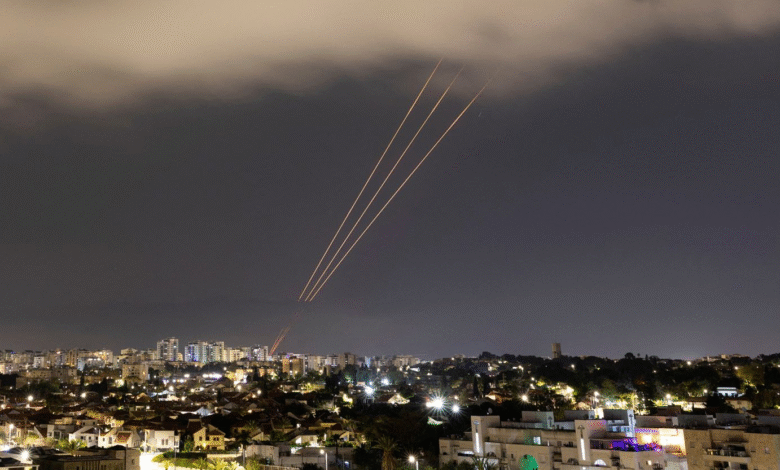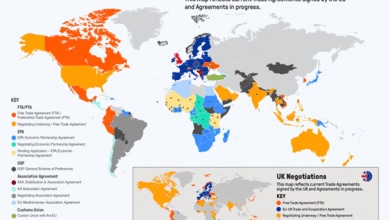Iran-Israel Drone Conflict Escalates with Major Attack

The Iran-Israel drone conflict has escalated dramatically with Iran launching over 100 drones toward Israeli territory, a critical event following an aggressive missile strike by Israel that eliminated top military leaders in Iran. This unprecedented attack marks a significant surge in tensions between the two nations, reminiscent of conflicts from decades past. As the military operations unfold, the ramifications extend beyond the combatants, sending ripples through global markets and triggering an oil price surge amid fears of a protracted conflict in the Middle East. With ongoing nuclear deal talks looming, both nations remain on edge, as Israel aims to curb Iran’s nuclear ambitions while Tehran seeks to respond to perceived existential threats. In this volatile atmosphere, international observers watch closely as the geopolitical stakes rise and the potential for a broader military engagement becomes increasingly likely.
The recent escalation in hostilities can be framed as a pivotal moment in the ongoing Iranian-Israeli struggle, particularly marked by the intense exchange of drone strikes. This confrontation signifies a broader dispute, emblematic of the Middle Eastern tensions that have long been brewing, especially over strategic assets and military might. As Iran intensifies its aerial offensives, Israel stands resolute in its military response, leading analysts to question the implications for regional stability. Observers note that the implications of these developments not only affect bilateral relations but also have the potential to disrupt global markets, especially in the oil sector, as countries grapple with the fallout from a potential wider conflict. In this complex scenario, the discourse surrounding oil price fluctuations and diplomatic efforts concerning nuclear agreements remains central to understanding the evolving dynamics.
The Implications of the Iran-Israel Drone Conflict
The recent escalation in the Iran-Israel drone conflict marks a dangerous turning point in Middle East tensions. Iran’s launch of over 100 drones toward Israeli territory is not only a military provocation but also a message of defiance following Israel’s lethal strikes that resulted in the deaths of key Iranian military leaders. This unprovoked aggression has raised concerns among regional and global powers about the potential for an all-out conflict that could disrupt the already volatile situation in the Middle East.
As the situation develops, the geopolitical ramifications are widespread. The conflict could lead to an increase in oil price volatility, given that this region is a significant supplier of oil globally. Investors are on edge, and stock markets are reacting negatively, signaling fears of a broader confrontation that might involve more nations. The consequences of this conflict are not isolated to the Middle Eastern landscape; they have far-reaching implications, including potential disruptions in energy supplies and heightened tensions between superpowers interested in the region.
Regional Responses to Rising Middle East Tensions
The repercussions of the recent drone attacks by Iran have sent shockwaves throughout the Middle East. Neighboring countries, particularly those that have maintained a distance from direct involvement in the Iran-Israel conflict, are increasingly concerned about their own security. For example, Jordan’s interception of Iranian drones indicates a rising threat perception among countries that could become collateral damage in this escalating animosity. This regional anxiety is palpable and could lead to new alliances forming in response to perceived threats.
Moreover, nations involved in the broader geopolitical discussions, like the United States, have found themselves walking a tightrope. While the U.S. has stated it was not involved in Israel’s military actions, the potential for escalation could involve American interests or personnel, which would necessitate a larger American response. Such dynamics could lead to a long cycle of retaliation and reprisals across the region, exacerbating the already tense environment surrounding oil trade and nuclear negotiations.
The Impact of Oil Price Surge Following Conflict
Following the Iranian drone attacks and Israeli strikes, the immediate impact on global oil prices has been significant. With Brent crude reaching $78 a barrel and a subsequent rise in prices, markets are reacting to the possibility of disrupted oil supplies due to heightened military tensions. Analysts predict that sustained conflict in the region could push prices even higher, affecting global economic stability and consumer prices worldwide. This volatility draws attention to the fragility of oil as a resource that’s intertwined with international relations.
Investors are closely monitoring the developments, as rising oil prices can trigger inflationary pressures in various economies. A surge in oil costs can lead to increased transportation and manufacturing expenses, which ultimately impact consumers. Furthermore, the scenario underscores the necessity for countries to consider diversifying energy sources to shield their economies from shocks stemming from geopolitical conflicts in oil-dependent areas, such as the Middle East.
The Role of Nuclear Deal Talks in Escalating Tensions
The timing of the Israeli strikes on Iranian military targets, particularly just days before crucial nuclear deal talks, has sparked considerable debate among political analysts. The offensive appears strategically designed to weaken Iran’s bargaining power ahead of negotiations. With the nuclear deal being a contentious topic, the sensitivity of military actions during this time only serves to heighten the already fragile diplomatic atmosphere. As both nations prepare for discussions, uncertainty looms over whether these talks will even proceed given the escalating military hostilities.
Furthermore, the positions taken by the involved parties could lead to a stalemate in future negotiations. Iran’s response to the attacks, threatening accountability for U.S. involvement, signals that the conflict could spill over into broader diplomatic tensions. The intricacies of the nuclear deal discussions now intertwine with military strategy, making the path to resolution more complicated. All parties must tread carefully as they navigate this delicate situation, balancing national security interests with the dire need for diplomatic engagement.
Global Economic Repercussions of the Iran-Israel Conflict
The burgeoning Iran-Israel conflict is set to have widespread economic implications far beyond the Middle East. As oil prices surge, global markets are beginning to feel the effect, prompting concerns of inflation and economic slowdown in countries reliant on imported energy. The potential for a prolonged military conflict in the region can disrupt oil supply chains, heightening uncertainty in markets and causing investors to seek refuge in safer assets. The ripple effects could potentially stymie global growth, as many economies struggle to cope with rising energy costs.
Furthermore, the interconnectedness of the global economy means that the disturbances in Middle Eastern oil supply could lead to a domino effect, impacting everything from inflation rates to foreign investments. Companies are keenly monitoring these developments, as consumer behavior shifts in response to increasing prices. Policymakers must remain vigilant, adapting strategies to mitigate the impact of such geopolitical conflicts on their national economies while navigating a precarious international landscape.
The Future of U.S. Involvement in Middle East Conflicts
The United States has long been a key player in Middle East conflicts, and the recent events surrounding the Iran-Israel drone conflict have raised questions about the future of American involvement in the region. With Secretary of State Marco Rubio distancing the U.S. from Israel’s military actions, the delicate balance of supporting allies while maintaining a degree of separation is increasingly complex. Observers are speculating whether a more defined U.S. strategy will emerge, one that not only addresses immediate threats but also seeks to stabilize an area fraught with longstanding tensions.
Breaking from the traditional stance of unwavering support for Israel, the U.S. may have to reassess its engagements in the region, especially as Iran escalates its military responses. Washington’s strategy could involve not only diplomatic efforts aimed at curbing Iran’s nuclear ambitions but also a recalibration of military alliances across the region. As tensions rise, American policymakers are under pressure to articulate a clear and effective approach that addresses the myriad challenges posed by these developments.
Analyzing Iran’s Military Strategy in Response to Israeli Strikes
Iran’s recent military strategy, particularly in the wake of Israeli strikes, illustrates an aggressive posturing that aims to counter perceived threats to its sovereignty. Following the elimination of high-ranking military officials, Iran’s response in launching over 100 drones towards Israel serves as a demonstration of military capability and a warning to Israel about potential retaliation. This strategy is rooted in a desire to assert dominance within the ever-complicated Middle Eastern geopolitical landscape.
Moreover, Iran’s utilization of drone technology underscores a shift in modern warfare. By investing in advanced military technology, Iran is not only enhancing its defensive capabilities but also challenging Israel’s military supremacy in the region. The tactical implications of such drone warfare raise questions about future confrontations and the potential escalation of conflicts, especially given the existing fear of broader military engagement involving other nations.
Iran’s Economic Strain and Its Military Objectives
While the Iranian government faces significant economic challenges, including sanctions and inflation, its recent military actions demonstrate a commitment to assert its influence in the Middle East. The economic strain should deter aggressive military operations; however, the regime appears to be leveraging these conflicts as a means to rally domestic support and distract from internal issues. This dual approach of military engagement paired with economic hardship shapes Iran’s strategic objectives moving forward.
As Tehran navigates sanctions and economic recession, its focus on military capability might serve not only as a deterrent but as an assertion of national pride and resilience. The paradox of a struggling economy coexisting with military aggression showcases the complexities facing Iran’s leadership. As it attempts to achieve regional dominance while managing economic realities, the implications for domestic stability and foreign relations remain profound, influencing its actions and strategies in the ongoing conflict with Israel.
The Strategic Importance of Drone Warfare in Middle Eastern Conflicts
Drone warfare has emerged as a pivotal component in modern military strategy, particularly in conflicts such as the ongoing Iran-Israel tensions. Iran’s recent large-scale drone attack highlights how unmanned aerial vehicles can potentially reshape the dynamics of warfare in the Middle East. The ability to deliver precision strikes with relative anonymity not only enhances tactical advantages but also complicates traditional military confrontations, as nations grappling with drone threats must adapt their defense systems accordingly.
As countries invest in advanced drone technology, the conflict surrounding these developments may escalate, prompting responses from adversaries like Israel that could lead to unexpected military confrontations. The strategic importance of drone warfare cannot be understated, as it provides a new frontier in conflict that may redefine the rules of engagement in international relations. The consequences of these technological advancements are far-reaching, influencing everything from military doctrines to the geopolitical balance of power within the region.
Frequently Asked Questions
What triggered the recent escalation in the Iran-Israel drone conflict?
The recent escalation in the Iran-Israel drone conflict was triggered by Israeli military strikes that killed senior Iranian military leaders. In response, Iran launched over 100 drones toward Israeli territory, marking one of the largest military responses since the Iran-Iraq war.
How are Middle East tensions impacting global oil prices amid the Iran-Israel drone conflict?
Middle East tensions, particularly resulting from the Iran-Israel drone conflict, have led to a significant surge in global oil prices. Following the Israeli strikes, Brent crude oil prices rose by as much as 13%, highlighting the market’s sensitivity to geopolitical instability in a region that supplies a significant portion of the world’s oil.
What are the implications of the Iran-Israel drone conflict on nuclear deal talks?
The Iran-Israel drone conflict has complicated nuclear deal talks between the U.S. and Iran, which were set to resume shortly after the Israeli strikes. The conflict raises concerns over Iran’s nuclear ambitions and military responses, potentially undermining diplomatic efforts to reach a viable agreement.
How did the international community react to the Iran-Israel drone conflict and military actions?
The international community reacted with concern to the Iran-Israel drone conflict and the accompanying military actions. Stock markets in Asia and Europe fell as investors sought safety, indicating fears of a broader regional conflict that could disrupt global stability and economic outcomes.
What potential consequences might Iran face following the recent Israeli military strikes?
Following the recent Israeli military strikes, Iran has warned that it will hold the U.S. accountable for the consequences of Israel’s actions. This suggests potential retaliatory measures, increased regional tensions, and further complications in diplomatic relations, particularly regarding U.S. involvement.
What is the significance of the number of drones Iran launched in response to Israel’s actions?
The launch of more than 100 drones by Iran in response to Israeli military actions is significant as it represents a major escalation in the Iran-Israel drone conflict. This large-scale response indicates Iran’s readiness to engage militarily, heightening tensions and signaling serious implications for regional security.
What role is the U.S. playing in the Iran-Israel drone conflict?
The U.S. has stated it is not involved in Israel’s military actions against Iran but has urged Iran not to target U.S. interests in the region. The U.S. is monitoring the situation closely, especially given the implications of the Iran-Israel drone conflict on broader Middle East stability and ongoing diplomatic discussions.
In what ways could the Iran-Israel drone conflict affect regional security dynamics?
The Iran-Israel drone conflict could significantly affect regional security dynamics by increasing military tensions and prompting potential retaliatory actions from both sides. This could lead to broader conflicts, impact oil supply stability, and affect existing alliances and geopolitical strategies within the Middle East.
How are investors reacting to the Iran-Israel drone conflict and its impact on the markets?
Investors are reacting to the Iran-Israel drone conflict with caution, resulting in declines in Asian and European stock markets. This behavior reflects concerns over potential disruptions in oil supply and broader geopolitical ramifications that could affect global economic stability.
What might be Iran’s next steps following its drone strikes in the ongoing conflict with Israel?
Iran’s next steps following its drone strikes may involve further military actions, strategic positioning regarding U.S. relations, and potential responses to Israeli provocations. With heightened tensions, Iran may also leverage its allies in the region to counter Israel’s military influence.
| Key Point | Details |
|---|---|
| Iran’s Drone Launch | Iran launched over 100 drones towards Israeli territory following missile strikes from Israel that killed three high-ranking Iranian military leaders. |
| Significance of Attack | This assault is noted as the largest against Iran since the Iran-Iraq war in the 1980s. |
| Impact on Markets | Stock markets in Asia and Europe fell as global investors became wary of a possible escalating conflict. |
| Israeli Strikes Confirmation | Israeli Defense Forces confirmed the elimination of senior military leaders in their operation aimed at nuclear facilities. |
| Rising Oil Prices | After the attack, oil prices saw a significant surge, with Brent crude prices hitting $78 per barrel at their peak. |
| U.S. Involvement | The U.S. State Department denied involvement in the Israeli strikes, while Iran warned of repercussions, implicating the U.S. in the conflict. |
Summary
The Iran-Israel drone conflict has escalated dramatically, with Iran responding to Israeli strikes by launching over 100 drones towards Israel. This marks a critical juncture in regional tensions, particularly as key military leaders in Iran were reportedly killed in Israeli actions. The implications for oil markets and international relations are profound, emphasizing the potential for wider conflict. As both countries navigate this volatile situation, the global community is watching closely.




